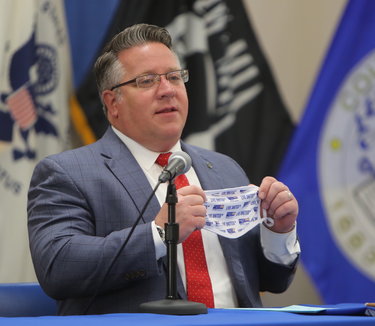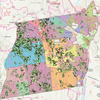State follows CDC guidance relaxing mask and distance rules, starting May 19
On Monday afternoon, with 42 percent of New Yorkers fully vaccinated against COVID-19, Governor Andrew Cuomo announced that the state is adopting last week’s guidance from the Centers for Disease Control and Prevention for fully-vaccinated people on social distancing and mask-wearing.
Last Thursday, March 13, the CDC changed its guidance which had, for more than a year, required Americans to wear masks and stay at least six feet apart when out in public.
The announcement came as infection rates are falling across the country, but individual states could override the federal guidance.
Starting on Wednesday, May 19, New York State will adopt the CDC’s “Interim Public Health Recommendations for Fully Vaccinated People” for most business and public settings.
People are considered fully vaccinated two weeks after their second shot of the Moderna or Pfizer-BioNTech vaccine or two weeks after the single Johnson & Johnson shot.
New York State’s guidance, just like the CDC guidance, is still requiring masks and social distancing in schools serving pre-kindergarten through 12th-grade students; on public transit, in homeless shelters, in correctional facilities, in nursing homes, and in health-care settings.
As of Monday morning, half of New Yorkers had received at least one dose of vaccine while 41.8 percent had completed a vaccine series. At the same time, 52.2 percent of New Yorkers ages 18 and older had completed vaccine series.
“The people of New York and visitors alike should take solace in the lifting of mask requirements, but be respectful of those who may still feel safest wearing their mask in public and business owners who may still ask patrons to don their mask,” said Cuomo in a press release, announcing the new state guidance.
“By the CDC guidance, immunocompromised people and vaccinated people should continue to wear a mask and social distance, but if you are vaccinated, you are safe. No masks, no social distancing,” said Cuomo at a Monday press conference at Radio City Music Hall in New York City.
He also said, “Individual private venues still have the ability to add additional guidelines to the state guidelines and the CDC guidelines. But, for our part, we’re adopting the CDC and we’re saying: Let’s open.
“This comes at a good time for New York because we had already said we were going to do our major reopening this Wednesday. So this Wednesday, most capacity restrictions are lifted in the tri-state area, New Jersey, Connecticut … Outdoor food and beverage curfew is lifted today. Indoor food and beverage lifted May 31st. Outdoor gathering increased to 500, indoor to 50 indoor residential gathering to fifty, 24-hour subway service has returned.”
Cuomo went on to announce a slew of openings, including the return of the New York City Marathon — scheduled for its 50th run on Nov. 7.
“Many people come, it will be at 60 percent capacity, 33,000 runners,” said Cuomo. “They'll have health and safety guidelines. Registration opens on June 8th.”
He also announced county fairs — like Altamont’s fair serving Albany, Schenectady, and Green counties — that were shut last year can reopen.
“They are all allowed to open up to the capacity of six-feet social distancing,” said Cuomo. “The local department of health will issue a permit, New York State Department of Health approves events over 5,000. Private operators can, again, set their own rules or a government-owned venue can set additional rules.”
The Tribeca film Festival is opening on June 9, he said.
Cuomo opined that John Rockefeller built the futuristic Radio city Music Hall in the midst of the Great Depression to inspire and show hope.
He said of capacity in the hall, “And we do want to say directly 100 percent at Radio City Music Hall. So, if I’m not vaccinated, I can’t go? That’s right. That’s right. The whole point of the CDC’s change, the whole point of our change, is to say to people: There are benefits to being vaccinated.”
State guidance
To implement the CDC’s guidance, New York State will be revising the following reopening guidelines to take effect on May 19:
— Business Mask Rules: The state is authorizing businesses to continue to require masks for all in their establishments, consistent with the CDC guidance. In most settings, vaccinated individuals will not be required to wear a mask. Unvaccinated individuals, under both CDC and state guidance, must wear masks in all public settings.
The state’s health department strongly recommends masks in indoor settings where vaccination status of individuals is unknown.
This recommendation will apply across commercial settings, including retail, food services, offices, gyms and fitness centers, amusement and family entertainment, hair salons, barber shops, and other personal-care services, among other settings;
— Business Capacity Rules: Most business capacities — which are currently based upon percentage of maximum occupancy — will be removed on May 19. Businesses will only be limited by the space available for patrons or parties of patrons to maintain the required social distance of six feet.
However, given that the CDC has advised that fully vaccinated individuals do not need to maintain social distance, businesses may eliminate the six feet of required social distancing, and therefore increase capacity, only if all patrons within the establishment — or a separate designated part of the establishment — present proof of full vaccination status. Proof of full vaccination status can be provided by patrons through paper form, digital application, or the State's Excelsior Pass.
For areas where vaccination status is unknown and for patrons who do not present proof of full vaccination status, the required social distance of six feet still applies until more New Yorkers are fully vaccinated. This change will apply across all commercial settings, except the exempt settings outlined by the CDC;
— Small- and Large-Scale Event Rules: Small-scale events will be able to apply the revised business mask and capacity rules. Specifically, for events below the state’s social-gathering limit of 250 indoors or 500 outdoors, event venues will be able to require masks for all patrons — and the state’s health department strongly recommends masks in indoor settings where vaccination status is unknown — and social distancing of six feet will be required between parties of attendees, unless all attendees present proof of full vaccination status. Unvaccinated people should still wear masks.
For large-scale events that exceed the state’s social-gathering limits, event venues will only be limited by the space available for patrons or parties of patrons to maintain the required distance, such that unvaccinated attendees must be spaced six feet apart in assigned sections; fully vaccinated attendees may be spaced directly next to one another at 100 percent capacity instead of six feet apart in assigned sections.
Children under the age of 12 who are not yet vaccine eligible, and under the age of 16 who have not yet been able to be vaccinated, may accompany and be seated with a vaccinated adult in a fully vaccinated section.
Proof of full vaccination status can be provided by attendees through paper form, digital application, or the State's Excelsior Pass.
For large-scale events, proof of recent negative COVID-19 test results for attendees who are over the age of 4 remains required for unvaccinated attendees in indoor event settings above the state’s social gathering limit but will become optional in outdoor event settings.
Updates will be posted on the state’s website.
CDC highlights
The May 13 CDC guidance says, “Currently authorized vaccines in the United States are highly effective at protecting vaccinated people against symptomatic and severe COVID-19. Additionally, a growing body of evidence suggests that fully vaccinated people are less likely to have asymptomatic infection or transmit SARS-CoV-2 to others. How long vaccine protection lasts and how much vaccines protect against emerging SARS-CoV-2 variants are still under investigation.”
The CDC guidance makes these key points for fully vaccinated people. They can:
— Resume activities without wearing masks or physically distancing, except where required by federal, state, local, tribal, or territorial laws, rules and regulations, including local business and workplace guidance;
— Resume domestic travel and refrain from testing before or after travel or self-quarantine after travel;
— Refrain from testing before leaving the United States for international travel (unless required by the destination) and refrain from self-quarantine after arriving back in the United States;
— Refrain from testing following a known exposure, if asymptomatic, with some exceptions for specific settings;
— Refrain from quarantine following a known exposure if asymptomatic; and
— Refrain from routine screening testing if feasible.
For now, fully vaccinated people should continue to get tested if experiencing COVID-19 symptoms; and should follow CDC and health department travel requirements and recommendations.



